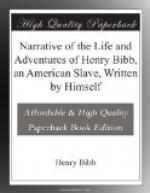And who had a better right to eat of the fruits of my own hard earnings than myself? Many a long summer’s day have I toiled with my wife and other slaves, cultivating his father’s fields, and gathering in his harvest, under the scorching rays of the sun, without half enough to eat, or clothes to wear, and at the same time his meat-house was filled with bacon and bread stuff; his dairy with butter and cheese; his barn with grain, husbanded by the unrequited toil of the slaves. And yet if a slave presumed to take a little from the abundance which he had made by his own sweat and toil, to supply the demands of nature, to quiet the craving appetite which is sometimes almost irresistible, it is called stealing by slaveholders.
But I did not regard it as stealing then, I do not regard it as such now. I hold that a slave has a moral right to eat drink and wear all that he needs, and that it would be a sin on his part to suffer and starve in a country where there is a plenty to eat and wear within his reach. I consider that I had a just right to what I took, because it was the labor of my own hands. Should I take from a neighbor as a freeman, in a free country, I should consider myself guilty of doing wrong before God and man. But was I the slave of Wm. Gatewood to-day, or any other slaveholder, working without wages, and suffering with hunger or for clothing, I should not stop to inquire whether my master would approve of my helping myself to what I needed to eat or wear. For while the slave is regarded as property, how can he steal from his master? It is contrary to the very nature of the relation existing between master and slave, from the fact that there is no law to punish a slave for theft, but lynch law; and the way they avoid that is to hide well. For illustration, a slave from the State of Virginia, for cruel treatment left the State between daylight and dark, being borne off by one of his master’s finest horses, and finally landed in Canada, where the British laws recognise no such thing as property in a human being. He was pursued by his owners, who expected to take advantage of the British law by claiming him as a fugitive from justice, and as such he was arrested and brought before the court of Queen’s Bench. They swore that he was, at a certain time, the slave of Mr. A., and that he ran away at such a time and stole and brought off a horse. They enquired who the horse belonged to, and it was ascertained that the slave and horse both belonged to the same person. The court therefore decided that the horse and the man were both recognised, in the State of Virginia, alike, as articles of property, belonging to the same person—therefore, if there was theft committed on either side, the former must have stolen off the latter—the horse brought away the man, and not the man the horse. So the man was discharged and pronounced free according to the laws of Canada. There are several other letters published in this work upon the same subject,




